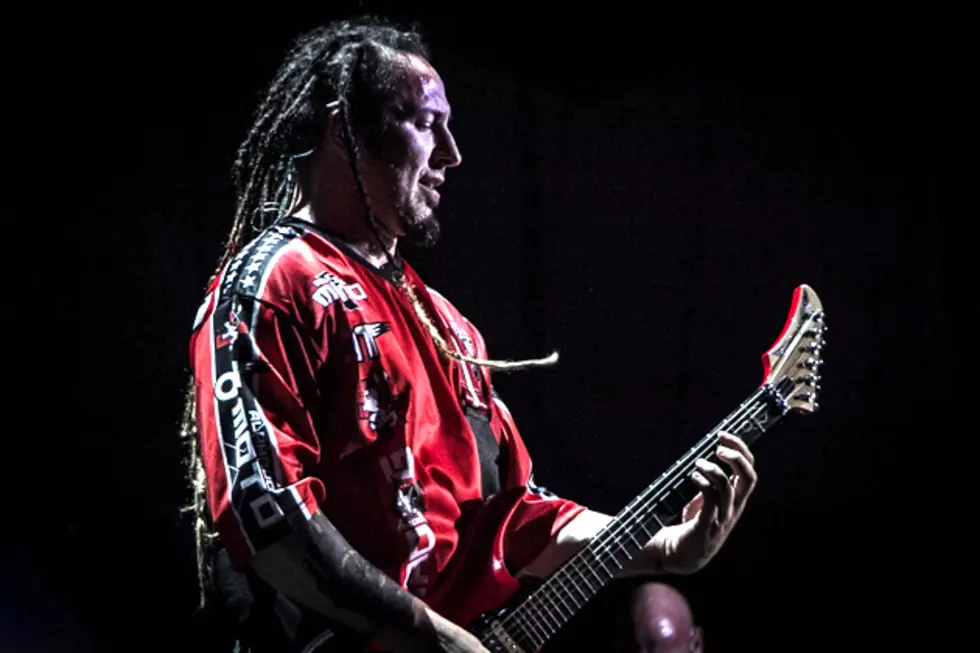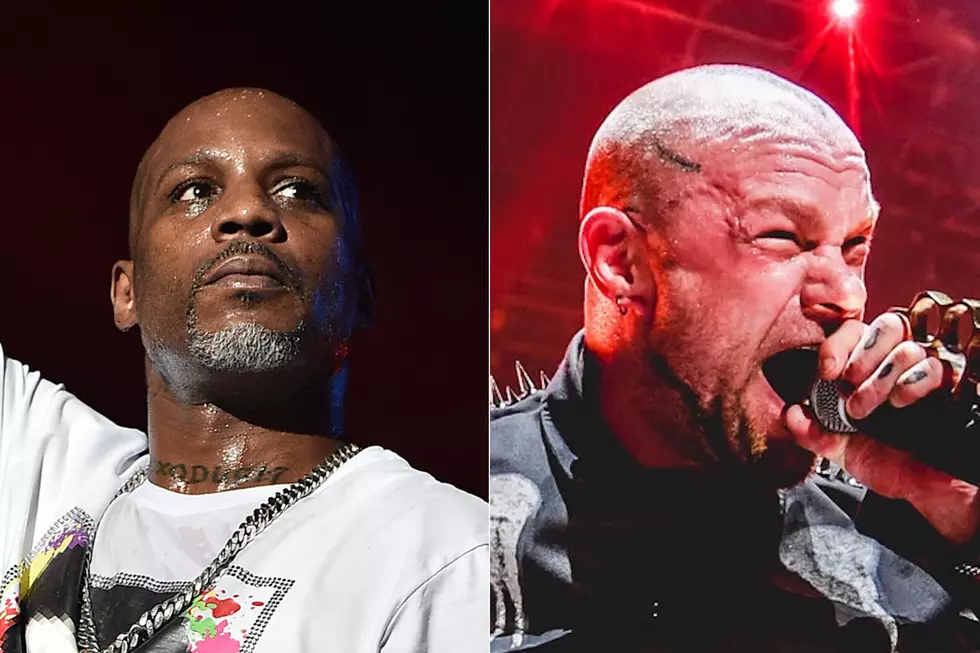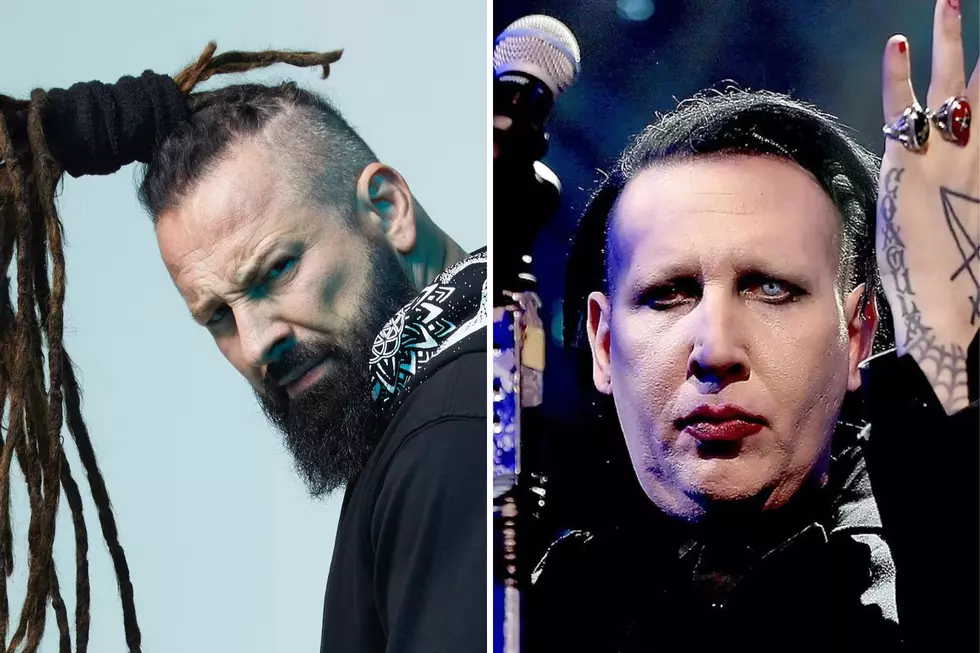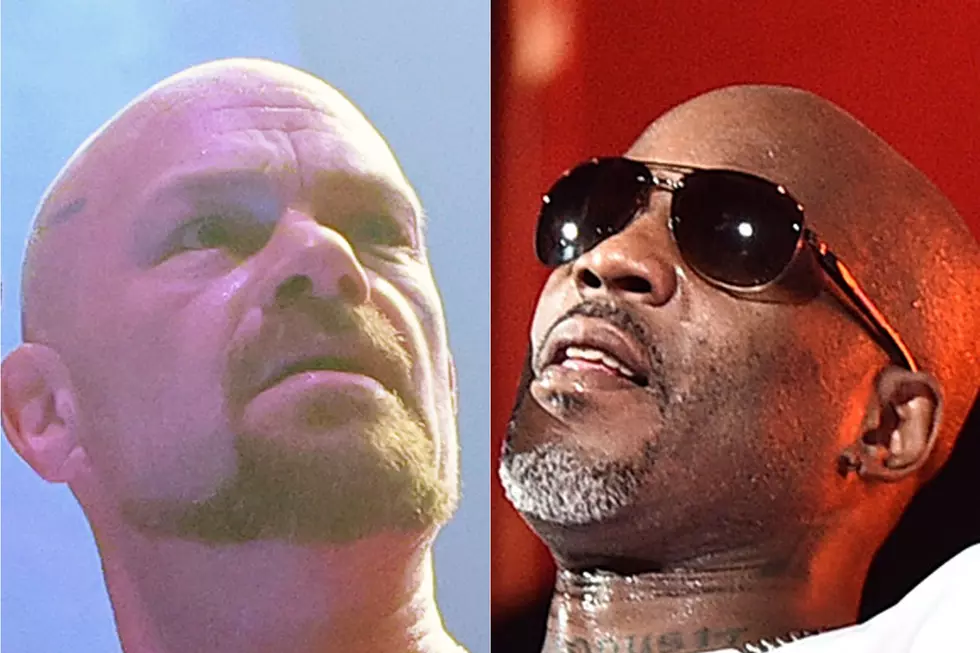
Five Finger Death Punch’s Zoltan Bathory Talks ‘Wrong Side of Heaven’ Video + Military Veterans
Five Finger Death Punch have definitely struck a chord with their powerful new video for 'Wrong Side of Heaven,' which is shining a light on the plight of returning military veterans and Post-Traumatic Stress Disorder. The clip is part of a larger campaign in which the band is seeking to bring public attention to the issues that servicemen and women have upon attempting to return to everyday life.
Guitarist Zoltan Bathory recently spoke with Loudwire about the video, their campaign and the close relationship the band has had with the military over the years. Check out the chat below:
The 'Wrong Side of Heaven' video is quite powerful. To start, could you talk a little bit about what got you into this video and the extended campaign?
Well, to make a long story short, basically for years we've been touring and visiting with the military -- the service and staff and all the guys and the men and women that are serving. It's been years and years that they are serving in military bases and this is going on and we built a lot of friendship and a lot of connections to these guys obviously, so some of them are personal friends and we built friendships in some way. So we got to know them personally and got to know their problems and their issues that they are experiencing and some of the numbers and they're just astonishing. You know, especially with post-war vets.
We even found some research and this is an all encompassing problem. It's just absolutely astonishing the suicide rates along veterans. Over 5,000 soldiers take their lives every year, that's every two hours that it is done and PTSD is a big problem among people. I'm seeing my friends and I'm seeing soldiers and I read stories about how their families are disintegrating and how they can't shake it and what a big issue it is. 460,000 is the estimated number that struggle with it and it's probably higher, you know? Then there are just these staggering numbers -- 300,000 veterans every day on the street homeless.
And in one of the most well off countries in the world, especially one that spends this much money on military and military equipment, it's just astonishing. Even for us who are very close to these guys, some of the things they said are so unbelievably mind-blowing that the thought was, you know what, if there is going to be change the change is going to start with public awareness. Because simply, most people say they don't know this information.
Media is hopping around. Everyday something else is happening and this is just not followed anymore. This war moved on but that doesn't mean the problem was solved. So we figured it's really going to change public awareness and we just have to start there. Let's not throw anybody under the bus. You don't want to throw the military under the bus, they're trying but they don't necessarily have the budget. It was more like for us, drawing the line here. Let's not talk about who sent who and why. That's not going to solve anything right now. Right now you're going to solve something if you look at the situation now and there's something about it that starts the public awareness if the general public know that there is a problem and it is misrepresented.
Let's get into the video. Like you said, the statistics are just staggering. We see the depiction of several soldiers in the video. Are any of them actual veterans?
Yes, some of them were were actual veterans. Generally the band employs a lot of veterans anyway, in the past and in the future. Every time you can't help with something it's great, so we had many drivers, those were veterans, guitar techs -- so it's an ongoing thing and every time we can we employ veterans we do. The last video had a good few of them in there and this one too and a lot of consultants and everybody who was around this video was -- we definitely tried to include them in any way we can.
It's just such a powerful clip. What your reaction was when you saw what director Nick Peterson had put together for the video.
Well, basically how this really happened was this. We wrote the treatment. Mainly I was writing the treatment with half of the guys and with half of some some friends that were in some situations so we could actually pull some real life events that actually happened to people. I just wanted to show understanding and empathy about how they see themselves and trying to put myself in their shoes. So we wrote this treatment and then we were trying to find the director who would understand and be passionate about this.
We worked with Nick before and we did another video and campaign for teenage suicide. We knew that he has an understanding in portraying dramatic situations that would really hit you in the chest and that was the goal. We wanted to do something emotional that people can immediately understand and can connect to, so we decided to go to Nick and I was really starting pick up the points. He understood and we can rap from there and go to the treatment and make it difficult in a video format so it was a theme we worked with.
However, we were on tour when the video was shot. I had utter passing confidence in him to do the right thing but once they did the shoot and I got the first raw footage, I was blown away because I knew it was going to be good but it was better than I thought and I already had really high expectations from him. So, first time I watched it, I choked up. I knew the treatment, I had been working on that treatment for quite some time. It just does what it needs to be. It reminds everyone and it will collect everyone's emotions. Emotions will make the needle move to where you can understand what they're going through. It had to be portrayed in a way that people can be emphatic and in some way put themselves in their shoes.
This is part of a larger campaign you guys are doing and I know you guys were just at Nellis Air Force base screening this video. Can you talk a little bit about getting a chance to talk with some of the military and seeing their reactions to the video as you showed it to them.
Nellis Air Force base is right here in Las Vegas, where we live, so this was just a given. To us it's kind of the norm because we go to these military bases all the time. So basically, it's almost like I know the math, I know everything about the base. But, the thing is worked out for quite some time so this became sort of another particular routine. Everyday it's something different but there's a way that things are done and when we went there it was a huge turnout -- hundreds and hundreds of soldiers and their families -- and they got to see the video the first time. I just thought it was the proper way to do this and every reaction was amazing.
For these guys especially, it's hard to watch because it's their lives. So, you're in it for them who are living in it and every single one of them understands this problem because they live with this problem. Everybody got teary eyed and it's hard and that was basically another point we were trying to make. I think it came through and talking to the soldiers on the base actually, it was immediate feedback. Everybody was really grateful for us doing it and also everybody understood immediately.
Part of the issue is that soldiers were trained and bred to survive and fight and don't take a step back and figure it out. If you're wounded, walk it off. Keep going, you know? So these guys are very hard and tough guys that can survive circumstances that you and I would have a problem with. They were trained to do this and it's not really in their nature to reach out for help and when they come home.
They have PTSD or a traumatic brain injury and are having psychological problems but they don't necessarily reach out for several reasons. A) Because they don't want to feel weak. They don't want to feel weak so they feel ashamed to ask for help or some of them think they don't know there is help. They don't know that if you call one of these organizations, most likely you're going to talk to a veteran and if it's not a veteran, ask for one. Then you're talking to someone about your issues because they probably have it, too, so you don't have to live with the feeling that you can't connect. That's one thing!
Second, the brain is an organ and just because it's an invisible wound, it's still a wound. If you get shot you still need help, right? So, there is no shame in having a brain injury or if you have PTSD, you have to reach out. There are plenty of helping hands, there are over 400,000 guys dealing with this. So if you have it, it's not unique in a way of you're not alone with this problem. There's a brother that's reaching out. Just grab their hand and you know they can help. There is life after this.
There are guys who run through this darkness and came out the other side and now they're successful business people or individuals back in society and they're okay and they kept their family together, so it's possible if you need to reach out. That's was just a message for the soldiers themselves, so aside from raising public awareness, it's that people who don't know about this should know about this. It's also an avenue for the military that the veteran’s understand that there is help, they can reach out and it's okay.
It's a testament to you guys, your fans and the power of this video that the 'No One Gets Left Behind' jersey you guys have created has already surpassed its fundraising goal. Can you talk a little bit about the jersey fundraiser and the response that you've already gotten off of that?
Basically, the jersey -- every tour we have a different one and it's just an item that we always add something unique to our band. The style of it at least, it's like a motocross/paintball jersey. So, we were thinking about how our fans buy these jerseys, so why don't we decide that we donate every single time and why don't we try actually to do some kind of monetary donation where we would design these jerseys, put it up as a fundraiser and then let's see what happens. Everybody wins! Our fans got the jersey they would have gotten anyway and all the proceeds are going to go to organizations that do actually make the difference in veterans' lives.
We kind of had an idea that it was going to go really well, but we wanted to put it up just to make sure it actually happens and it was astonishing to see that we reached our goal within the first 14 or 15 hours. We hit that mark and it keeps going 140 or 150 percent. We still have [many] days to go, so who knows how far we can go with this and when it's done and the campaign concludes and we can take the proceeds and all the profits are going to go to these organizations and like I said, they make a difference.
I also think it's really cool what you're doing with the dog tag memorial and the fact that it's going to be a part of the fall tour. Can you talk a little bit about that and how people can get involved with getting their stuff to you.
That came from an idea where we were playing shows all over the world near bases and even most shows we have a large number of military service members in the crowd. They're fans and it became a customary thing that they would throw their dog tags onstage. So when you get a dog tag it's kind of an honor and you don't just throw them away, you keep it. It started by us collecting a lot of these dog tags that soldiers would throw on the stage and one day we had this idea that we would start this campaign and fire on all cylinders.
Basically this campaign will be successful and make a difference if we really cover all the possibilities, we clog every hole, we march down as many possible avenues and focus into this one big campaign. So that's why the video, the jersey and the dog tags are basically used. We assembled a backdrop. Every band has a backdrop right? So, we figured why not, instead of having a regular backdrop like we used to have, let's assemble a backdrop that's entirely made of dog tags of soldiers that served, or have been serving, are still serving or fallen soldiers. We make this backdrop and that's what we're going to tour with.
So, as a reminder, it's an honor for us. We're going to play in front of a backdrop that means something, that is really every single one of those tags came from someone who served this country and it's a reminder to the fans and a reminder to everyone. And also we'll be talking about it. When it's in the media it also brings up a lot of awareness and that's the goal.
Once we accomplish the backdrop, we're going to tour with it. Who knows how long and if we ever retire this, but we're going to donate it to some kind of a war museum, so we can call it the "wall of heroes" and we want it to stay around forever or as long as possible. Basically, that's the idea.
These are little ideas on their own. We chased a good idea, but when you add them all together into one big picture then together they can really make a difference and with the fundraiser, this and the video I think in the first 24 hours I can already see the difference. It's already moving. We're already getting emails, talking to these organizations I didn't know about yet and been hooking up with more and more.
Organizations hit us up and we research them and go through the numbers. We see how much goes where so it's not guzzled up and what not. We research organizations and try to make a difference. Then we add them to the campaign and we're 24 hours in and it's already rolling, so this is a good thing.
Absolutely.
When we started to do this video, that was pretty much the idea. We were not going to do another video in this cycle but this problem --- we were talking about it and as we learned about it, it kind of sprung the idea that we have a song that probably best describes the feeling that these guys are going through --the wrong side of heaven, the righteous side of hell -- it's sort of the ways that I can imagine these guys, because where these guys are, you're damned if you do, you're damned if you don't. And the question -- is it right or is it wrong? -- the public needs to understand that these guys are in the military, there's a chain of command. So, a military member, a soldier, is not necessarily going to question politics. There is a chain of command. He will do his job, he will do what he's told. He's not going to question that. You're going to just do your job to your best ability and defend the man that's next to you. That's your job and that's what you accomplish, but that doesn't mean that these guys are not into politics. They still think about -- is it right, is it wrong?
Also, society cannot project views on this or them, because they're just doing their jobs and it's right and they think it's good. On the other side, they can't project this guilt, because society -- in reality, did you or I send them there -- not directly but we have the power to elect the people who will make the right or wrong decisions, so as society it's our responsibility to elect people -- to elect officers, elect political leaders that will make the right decisions.
They will pay attention to this and elect people who make the right decisions and not abusing the force. They're not sending the military to places for the wrong reasons. It's our responsibility, as society, and I would say that public opinion is shaping the side for the soldiers because they are in that position. They are wandering about. It's becoming whole and everyone hugs them, thanks them and says thank you guys for what you're doing or just feeling that they're going anywhere but they just exist.
The general population doesn't necessarily know these exist in the Army, meaning it's invisible because you don't get your house bombed, the first day you get your house bombed, you're going to question -- where was the Military? See, that doesn't happen, you know? Since your country is not violated by other countries, you don't really think about it. You go to your job, you bitch about the pizza guy being five minutes late and you're paying and you're not thinking about how this is all really possible because, there is an invisible shield. For you, it's invisible, for them -- it's very real. There's a shield and these soldiers are there.
We have an Army that prevents that as much as possible and this shield is made of the bodies of the soldiers who sign up and they lay down their lives. That has to be respected and that has to be remembered. I think it's hard to hear about things, how they go about their lives in the court of public opinion.
Well said. Zoltan, thank you so much for your time today. I commend you for what you guys are doing with this video and the campaign.
Our thanks to Five Finger Death Punch's Zoltan Bathory for the interview. To get more involved in the band's support of military organizations, check out the group's special website at 5FDP4VETS.com.
Watch Five Finger Death Punch's 'Wrong Side of Heaven' Video
More From Loudwire









